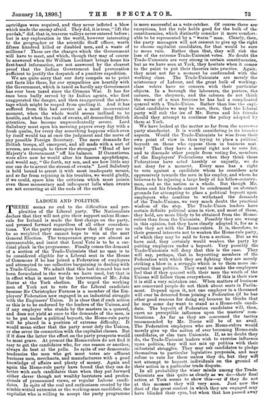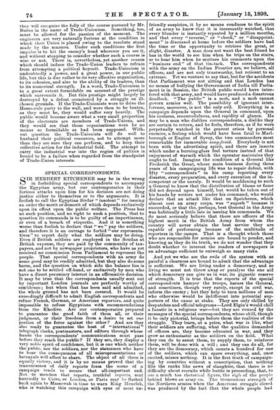LABOUR AND POLITICS.
THERE seems no end to the difficulties and per- plexities of the Liberal party. The Nationalists declare that they will not give their support unless Home- rule for Ireland is made the first charge on the party, and pressed forward regardless of all other considera- tions. Yet the party managers know that if they are to be so weighted they cannot hope to win at the next General Election. The temperance group are almost as unreasonable, and insist that Local Veto is to be a car- dinal plank in the programme. Finally comes the demand of a section of the Trade-Unionists that no man is to be considered eligible for a Liberal seat in the House of Commons if he has joined a Federation of employers and attempted to use collective bargaining in dealing with a Trade-Union. We admit that this last demand has not been formulated in the words we have used, but that is in effect what is meant by the intervention of Mr. John Burns at the York election. He urged the working men of York not to vote for the Liberal candidate because Sir Christopher Furness is a. member of the Em- ployers' Federation now engaged in an industrial struggle with the Engineers' Union. It is clear that if such action as this is to be endorsed by the leaders of the Unions, and if any employer who stands by the masters in a quarrel, and does not yield at once to the demands of the men, is to be put under a political boycott, the Home-rule party will be placed in a position of extreme difficulty. It would mean either that the party must defy the Unions, or else sever its connection with the capitalist classes. But if it does the latter the effect on the party prospects would be most grave. At present the Home-rulers do not find it easy to get the candidates who, for one reason or another, always do best at the polls. In spite of our democratic tendencies the men who get most votes are affluent business men, merchants, and manufacturers with a good knowledge of affairs and plenty of money. Again and again the Home-rule party have found that they can do better with such candidates than when they put forward either clever though not wealthy barristers and profes- sionals of pronounced views, or regular Labour candi- dates. In spite of the zeal and enthusiasm created by the nimble-witted extremist or the working-man candidate, the capitalist who is willing to accept the party programme is more successful as a vote-catcher. Of course there are. exceptions, but the rule holds good for the bulk of the constituencies, which distinctly consider it more comfort- able to be represented by a " warm " man. Clearly, then,. the party managers will not consent to give up the right to choose capitalist candidates, for that would be sure to mean ruin. Rather than that, they will risk the loss of the extreme Trade-Unionist votes. No doubt the Trade-Unionists are very strong in certain constituencies, but as we have seen at York, they hesitate when it comes to the point to put their theories into practice. Again; they must not for a moment be confounded with the working class. The Trade-Unionists are merely the aristocracy of Labour, and the great bulk of working- class voters have no concern with their particular objects. In a borough the labourers, the porters, the carmen, the shopmen, and the cabmen do not think the worse of a man because he has had a complicated quarrel with a Trade-Union. Rather than lose the capi- talist candidates we may be sure, then, that the Liberal party will risk the ire of Mr. Burns and his friends should they attempt to continue the policy adopted by them at York.
We have looked at the matter so far from the narrower party standpoint. It is worth considering in its broader aspects. Would the Trade-Unionists be wise from their own point of view in thus trying to place a political boycott on those who oppose them in business mat- ters? That they have a moral right not to vote fork.
and to dissuade other people from voting for, members of the Employers' Federations when they think those Federations have acted harshly or unjustly, we do not deny for a moment. Every man has a right to vote against a candidate whom he considers acts oppressively towards the men in his employ, and whom he believes to be injuring a large body of his fellow-country- men, and so the nation as a whole. But though Mr.
Burns and his friends cannot be condemned on abstract grounds for attempting to place a political boycott upon employers who combine to withstand the demands of the Trade-Unions, we very much doubt the practical wisdom of the step. The Trade-Union leaders have certain definite political aims in view, and most of these, they hold, are more likely to be obtained from the Home- rulers than from the Unionists. Possibly they are wrong in this opinion, but they have clearly adopted it, for as a rule they act with the Home-rulers. It is, therefore, to their general interests not to weaken the Home-rule party, of which they may be said to form a section. But as we have said, they certainly would weaken the party by putting employers under a boycott. Very possibly the Trade-Unionists will deny that this is the case. They will say, perhaps, that in boycotting members of the Federation with which they are fighting they are merely striking a blow in a struggle which is to them more im- portant than politics. They want to make the employers feel that if they quarrel with their men the wrath of the Unions will follow them everywhere. If this is their view it is still a very mistaken one. When matters of business - are concerned people do not think about seats in Parlia- ment. Depend upon it, not one employer in a thousand will ever be deterred from joining a Federation (if he has other good reasons for doing so) because he thinks that he may some day want to stand as a Home-rule candi- date. The boycott of Federation candidates will, then, exert no perceptible influence upon the masters' com- binations. As far as they are concerned the tactics recommended by Mr. Burns will be of no avail. The Federation employers who are Home-rulers would merely give up the notion of ever becoming Home-rule candidates, or else turn Unionists. If, as no doubt they do, the Trade-Unionist leaders wish to exercise influence upon politics, they will not mix up politics with their industrial struggles. They may ask candidates to pledge themselves to particular legislative proposals, and may refuse to vote for them unless they do, but they will not attempt to boycott individuals on the ground of their action in a particular trade dispute. In all probability the wiser minds among the Trade- Unionists see this quite as clearly as we do—their final action at York seems to show this—or if they do not at this moment they will very soon. Just now the dust of the great contest in which they are engaged may have blinded their eyes, but when that has passed away they will recognise the fully of the course pursued by Mr. Burns in the name of Trade-Unionism. Something, too, must be allowed for the passion of the moment. The engineers are very naturally furious at the condition in which their Union is placed owing to the resolute stand made by the masters. Under such conditions the first impulse is to hit the enemy's head wherever you see it, and without stopping to consider whether such a course is wise or not. There is, nevertheless, yet another reason which should induce the Trade-Union leaders to refrain from attempting a political boycott. Trade-Unionism is undoubtedly a power, and a great power, in our public life, but this is due rather to its very effective organisation, to its cohesion, and also to the ability of its leaders, than to its numerical strength. In a word, Trade-Unionism is to a great extent formidable on account of the prestige which surrounds it. But this prestige might largely be destroyed by a defeat occasioned by a struggle on ill- chosen grounds. If the Trade-Unionists were to drive the Home-rule party to the wall, and were then to be beaten, as they must be, they would suffer very heavily. The public would become aware what a very small proportion of the electorate are members of Trade-Unions, and they would see that those organisations were by no means so formidable as had been supposed. With- out question the Trade-Unionists will do well to husband their political resources, not to attempt more than they are sure they can perform, and to keep their collective action for the industrial field. The attempt to carry the industrial war into the region of politics is bound to be a failure when regarded from the standpoint of Trade-Union interests.



































 Previous page
Previous page